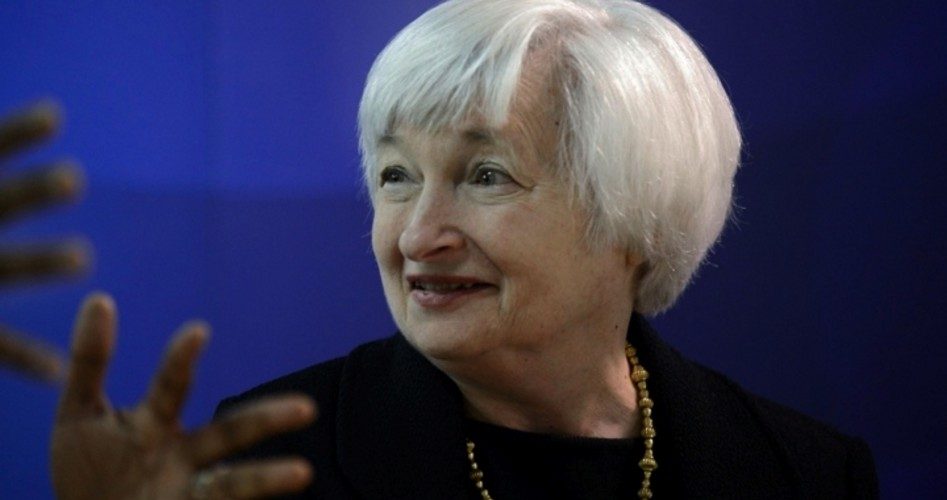
Speaking at the conference for community organizers and developers hosted by the Chicago Federal Reserve on March 31, Federal Reserve Fed Chair Janet Yellen (shown) said that the U.S. economy will need Fed stimulus for “some time.”
Citing stagnant labor conditions that she said are worse than previous recessions, Yellen made a case for the Fed’s continued active role in stimulating the economy: “This extraordinary commitment is still needed and will be for some time, and I believe that view is widely shared by my fellow policy makers. The scars from the Great Recession remain, and reaching our goals will take time.”
Fox Business reported that Yellen spoke of the plights of several individuals as examples to bolster her case that prolonged accommodative policy is needed to guarantee that the labor market improves, despite the fact that many people are calling for higher interest rates to prevent price inflation.
“Although we work through financial markets, our goal is to help Main Street, not Wall Street,” Yellen said, in what Fox described as “stark populist terms.”
“We are trying to lower the costs of buying a car that can carry a worker to a new job and kids to school, and our policies are also spurring the revival of the auto industry. We are trying to help families afford things they need so that greater spending can drive job creation and even more spending, thereby strengthening the recovery,” Yellen said.
As an indication of how closely Wall Street tries to anticipate (and responds to) the Fed’s actions, when Yellen stated at a March 19 press conference that the Fed would likely end its bond purchase program this fall, and then might start raising interest rates about six months later, stock prices declined. Conversely, after Yellen announced on Monday that the Fed would continue its low-interest rate policies, stock prices rose.
“It is an indirect pushback,” Ward McCarthy, chief financial economist at Jefferies LLC in New York, told Bloomberg News. “I don’t think she could directly contradict what she said at the [March 19] press conference, so she did the next best thing, which was to paint a picture of a Fed that is going to be accommodative for a long, long time.”
Bloomberg also quoted Thomas Costerg, an economist at Standard Chartered Plc in New York, who said of Yellen’s speech: “It was dovish and Yellen-esque, but she didn’t explicitly backpedal on the six months comment so that’s a ghost that will stay in the background. She didn’t explicitly say ‘Oh, I made a mistake,’ she just stressed the other way, that we need accommodative policy for some time.”
During that March 19 speech, Yellen said that the Federal Open Market Committee (FOMC) needs “to see where the labor market is” in setting its policies. She added that if inflation “is persistently below” the central bank’s two-percent goal, “that is a very good reason to hold the funds rate at its present range for longer.”
Bloomberg reported that The FOMC has kept the benchmark interest rate near zero since December 2008 and has sought to cut borrowing costs and stimulate growth through bond buying, which has more than quadrupled FOMC’s assets to $4.23 trillion.
A March 31 Reuters report theorized that Yellen’s very visible trip to Chicago — which included a stop at Daley College, a community college involved in job-training programs — may have been planned with the goal of protecting the Fed’s independence from “political interference.”
The Reuters writer suggested that if Yellen can convince college students of the worthiness of the Fed’s role in stimulating the economy, the central bank has a better chance to resist efforts in Washington it argues could erode its ability to make “unfettered decisions” on monetary policy.
“The Fed has been under attack because of some of the bailout policies that were followed during the financial crisis, and there is no vocal constituency on the Fed’s side,” Reuters quoted Robert Eisenbeis, a former research director at the Federal Reserve Bank of Atlanta who is now chief monetary economist with Cumberland Advisors.
“So, such outreach activities are simply an attempt to show that the Fed does care about the public,” he added. “Whether it will work or not is a different story.”
The report noted that until Yellen’s predecessor, Ben Bernanke, broke precedent, it was unusual for Fed chairmen to defend the Fed’s policies with public appearances. But in his last few speeches before retiring, observed Reuters, Bernanke said the Federal Reserve “needed to show that it is working in the public’s interest or risk losing its policy independence.”
In a telephone interview with Reuters, Representative Patrick McHenry (R-N.C.), who is Chairman of the Oversight and Investigations Subcommittee of the House Financial Services Committee, said that Yellen’s campaign to get her message out “is all well and good, but I think the average American is more concerned about the value of their money, how much things cost, and whether or not they have a job.”
“This type of tour might further highlight how political the Fed has become in intervening in the economy and the outsized role they play,” McHenry added.
While many media and financial commentators have spoken of the effect that the Federal Reserve’s actions have on the economy, few have questioned if this power is beneficial. Even fewer voices have suggested that such power concentrated in a few private hands is a dangerous threat not only to our economy, but also to our freedom.
One of the most outspoken opponents of the Federal Reserve’s polices — and indeed of the Fed’s very existence — has been former Texas Representative Ron Paul. Since retiring from Congress, Paul has continued to make his opinions on the Fed known through articles posted on his website, RonPaul.com.
In a column posted last November 18, as the Senate Banking Committee held hearings on Janet Yellen’s nomination as Federal Reserve Chair, Paul wrote, “As expected, Ms. Yellen indicated that she would continue the Fed’s ‘quantitative easing’ (QE) polices, despite QE’s failure to improve the economy.”
Paul then segued to an amazing statement made just two days prior to the Yellen hearings by Andrew Huszar, an ex-Fed official, who publicly apologized to the American people for his role in quantitative easing, which he described as “the greatest backdoor Wall Street bailout of all time.” Huszar made his remarks in a Wall Street Journal opinion piece on November 11 entitled “Andrew Huszar: Confessions of a Quantitative Easer.”
Paul continued to explain what is wrong with “quantitative easing”:
A quick glance at the latest unemployment numbers shows that QE is not benefiting the average American. It is increasingly obvious that the Fed’s post-2008 policies of bailouts, money printing, and bond buying benefited the big banks and the politically-connected investment firms. QE is such a blatant example of crony capitalism that it makes Solyndra look like a shining example of a pure free market!
But there is much more wrong with the Fed than QE, notes Paul:
By manipulating the money supply and the interest rate, Federal Reserve polices create inflation and thereby erode the value of the currency. Since the Federal Reserve opened its doors one hundred years ago, the dollar has lost over 95 percent of its purchasing power — that’s right, today you need $23.70 to buy what one dollar bought in 1913!
As good first steps to correct the central bank’s abuses, Paul recommends auditing the Fed and repealing legal tender laws, which would “allow Americans to protect themselves from the effects of the Fed’s polices. Auditing and ending the Fed, and allowing Americans to use the currency of their choice, must be a priority for anyone serious about restoring peace, prosperity, and liberty.”
When Dr. Paul was still a member of the House, he introduced The Federal Reserve Transparency Act, which would have provided for a full audit of the Fed’s monetary policy decisions. Amazingly, the bill passed the House in a bipartisan 327-98 vote in 2012. Though Rep. Paul’s son, Senator Rand Paul (R-Ky.), introduced similar legislation in the Senate, it did not advance very far in the upper chamber led by Senate Majority Leader Harry Reid (D-Nev.).
At present, the Federal Reserve Transparency Act of 2013, introduced by Rep. Paul Broun (R-Ga.) has 208 cosponsors. A companion measure, also entitled the Federal Reserve Transparency Act of 2013, has been introduced in the Senate by Sen. Rand Paul and has 29 cosponsors.
Americans concerned about the Federal Reserve’s long-standing excesses will want to encourage their representative and senators to support these common-sense measures to audit the Fed.
Photo of Federal Reserve Chair Janet Yellen: AP Images



